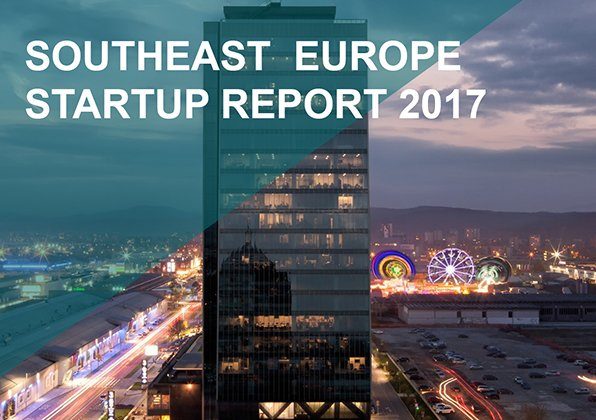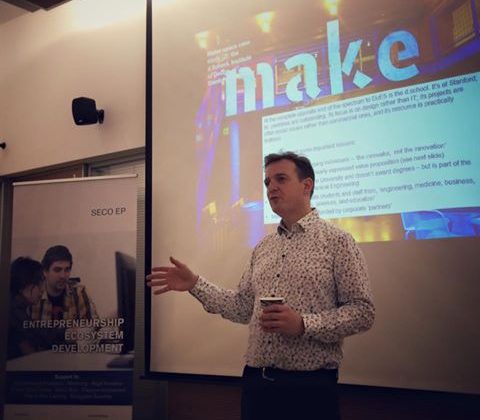Probably you have noticed that after a very active month (February) on vaskeni.com March has been a little quiet. The truth is that I, and the Albanian Entrepreneurial Ecosystem, have been fully immersed in three weeks of workshops and meetings with international experts for Mentoring, Ecosystems, Accelerator Programs and Business Models brought to Albania by the Swisscontact SECO Entrepreneurship Programme as part of its mission to build a self-sustainable ecosystem.
The first week of March was kicked off with three Major Events for mentors and accelerators/incubators of our ecosystem. Mike Ducker, J.E. Austin expert for Ecosystems and Mentoring introduced the benefits of mentoring to mentors and accelerators. He also worked with the actors that want to build a mentor pool for their activities in another workshop and a series of individual meetings.
Also, Iain Bennett, an expert from the UK, was in Tirana during the same time. He focused on supporting accelerators/incubators and other actors to improve their business models and accelerator programs.
Impressed by his in-depth experience from the London Startup Ecosystem and his long professional career focused on Accelerators I asked him some questions to have a better understanding of the stage our young ecosystem is in and what we should do in order to make it grow faster and work better.
Iain, after two weeks and two workshops and lots of individual sessions with key startup ecosystem actors in Albania, how would you describe the state of the ecosystem?
The ecosystem is in an earlier stage of development than had been assumed by many of the actors!
Actors had assumed that there was an idea of a startup culture based on the Silicon Valley model. We now recognize there is a need to go back a step to scope what capability, capacity, expertise, and experience exists both in ICT and in awareness of enterprise as an opportunity for growth and jobs.
We can’t expect to directly replicate a model from the US and other developed economies. We need to understand better what can grow in Albanian soil.
What do you see as the key strengths and weaknesses of existing accelerators/incubators?
Strengths:
- Some past commercial experience in some of the accelerator managers
- A desire to make it work
- Some great environments
- (In most cases) willingness to work together
Weaknesses:
- No track record
- Hardly any direct experience of managing an accelerator or incubator environment
- Overall lack of market awareness, particularly of high growth sectors and the barriers to entry to those market opportunities
- Lack of sector experience in a number of cases
- Inadequate horizon scanning of the prospects for: start up; ICT; the digital economy in Albania
- Inadequate planning; in particular, lack of market research into demand for acceleration
- No structured customer relationship management at any level (clients, multipliers such as Universities and employers in the sector, mentors, investors)
- No defined programme for the businesses
- Lack of data on the liquidity of the market: are there investors and purchasers in Albania/the region for the type of startups the accelerators are looking for? What kinds of valuations have other companies in the region achieved? Is there anything to support the idea that international investors already have, or may be attracted to establish, a presence in the Albanian market? Without this knowledge, the idea of seed capital is meaningless.
- Lack of effective risk management strategies – very closely linked to the point above – how would the accelerators themselves or other investors be able with any certainty to know if their portfolio had any value? If there is no prospect of investment or M&A, what kind of multiples of turnover and profit would make an accelerator sustainable on the basis that it would continue to be a shareholder and receive dividends? Are there other risks associated with maintaining holdings over a longer period?
- Poor marketing plans – indistinct value propositions + lack of research = likely failure
Where do you see opportunities for the accelerators/incubators in Albania?
If ICT is viewed as an enabler, and not an end in itself, the digital economy can drive the transformation of Albania’s service sector. Projects that target collaboration and research between digital startups and people and teams with domain-specific experience and expertise in administration, communications, distribution, logistics, manufacturing, retail, etc could work on a number of levels:
First of all, it could increase efficiency and productivity through tools and platforms offering to improve control, measurement, and management information of existing processes.
You may identify some companies that can disrupt inefficient ‘legacy’ providers and fine online substitutes or complements for existing vertical markets that are poorly served (eg Amazon and booksellers).
In some cases, finding solutions to the specific barriers that confront Albanian businesses looking to scale up may provide solutions for many other markets at a similar stage of development, or help identify solutions that may not be so pressing in other contexts. For example, the call center industry, whilst successful, is currently far down in the value chain of the industries it serves, and often foreign-owned, reducing its net impact on the Albanian economy as a whole. If intelligent agents can be designed that overcome challenges imposed by the large number of different ‘natural’ languages used by people in the region, this could not only offer a cheaper substitute in this market but also create commercial value that could be reinvested to use the natural language of call center operators more productively. The resulting solutions could also offer the export potential to other developing markets where the cost of providing customer service in a multitude of ‘natural’ languages is a brake on the growth of other service industries – eg Africa, particularly sub-Saharan Africa.
Based on your recent experiences with the accelerators/incubators in Albania, what are your predictions on the further development of the startup ecosystem in Albania?
I’m not in the business of making predictions. I am making a case for change. If the current actors don’t change there will not be any further development: without intervention and restructuring, there will continue to be insufficient demand for the product as currently configured.
What actions would you suggest to the actual actors to take in order to expand the actual small community in Albania into a much larger ‘startup’ community?
I pretty much answer this in my responses to (2) and (3) but to sum up:
In order to properly scope and interpret the true scale of the opportunity, first think about how the transformation of the digital economy could disrupt and transform other sectors of the Albanian economy to result in much higher levels of productivity, growth, jobs, and entrepreneurship.
The outcomes are likely to occur in the order described above – clear examples of how investment of knowledge, time, and money into new digital startups are needed to drive increased demand for accelerator/incubator support.
Encourage entrepreneurs to think about the transferability of anything you do: to adjacent territories, adjacent markets, or other territories or markets that share characteristics and barriers to those addressed by your product.
In the process, you will crystallize the opportunity to make Albania a ‘living lab’ for the design and testing of global solutions, taking advantage of what will hopefully be a short-term window in which you are a low-cost and low-wage economy.
Don’t limit your recruitment focus to undergraduates: successful entrepreneurs can be drawn from all parts of society, and need to if the economy is going to grow. Think about which of your current employees and interns can be mentored to try a startup. Get to kids in high schools before they are captured by the institutionalized thinking of their University lecturers. Participate in wider and more imaginative outreach in cities and towns outside Tirana.
Design programs that are attractive to a wider group of sponsors and clients – whether they offer solutions to specific problems in other industries, or speak to the CSR ambitions of (particularly) foreign direct investors in, or looking to enter, Albania.
Get some better data about the number and value of investments and M&A activity in early-stage companies in Albania in general, including those in ICT, and if possible the wider SE European region. Without it, you can’t with any authority establish the valuation of any of the companies in the ecosystem from time to time. There are very few institutional investors, and even fewer private investors prepared to act on that basis. No investors = no deals = no sustainability.
If there really is no existing evidence or culture of investment, and there is insufficient risk capital or public funding available to cover your operational losses the 5-10 years it may take to challenge the status quo, don’t be afraid to think the unthinkable – about how the sector might be bootstrapped in its entirety, or whether this is just not an activity that can take root in Albanian soil.
Initiate and publish research that demonstrates what Government could do that could really help build a tech sector – even if that is just to discourage it from investing in programs and facilities that duplicate existing activity and diminish the return on the private sector or donor investments.
Continue to think of yourself as one team and promote the entire package – you have a competitive advantage in your openness, your lovely surroundings, welcoming personality, great food, and a host of other benefits that have yet to be drawn to the attention of entrepreneurs and investors across the world. If there isn’t demand (yet) for startups in Albania, and the Government remains unresponsive or obstructive, could you bridge the gap with foreign private investment coming in to take advantage of Albania as a low cost, low wage but well-educated environment with great and widespread language skills, in particular English and Italian?
Keep in touch with me and with other international actors as part of your horizon scanning and market awareness – you’ll find people are glad to share their knowledge and contacts.


